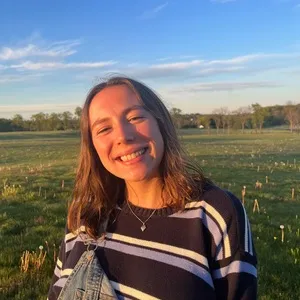This article is a part of the Spoon series The Deal With Diet Culture, covering health topics and products through the lens of food.
“What I eat in a day as a girl who likes to be healthy, but never counts calories.” This is how influencer Anastazia Dupee starts one of her TikTok videos. She goes on to show images and videos of her green juice, well-plated oats with fruit, and pumpkin soup. “I know this isn’t aesthetic, but it’s the truth. I had some cookies and a KIND bar,” she said later in the video.
Dupee is one of the hundreds of people that pop up when you search a simple #whatIeatinaday, a hashtag that currently has 15.2 billion views. In these What I Eat In A Day (WIEIAD) videos, content creators and influencers take us through their daily meals, showing portion sizes, doing body checks, and recommending brands and products.
For all the thousands of videos showcasing what influencers eat in a day, there are several comments asking “How many calories do you consume? You look great btw!!”, “What’s the calorie count here?”, or “How many days a week do you work out?”
The potential misinformation of ‘What I Eat In A Day’ videos
When watching these videos of content creators sharing their meals, it’s hard to tell if the advice or products they promote are actually healthy and sustainable. Maddie Kossin, who currently has over 200,000 followers on TikTok, captioned one of her WIEIAD videos “Four tips for making eating in a calorie deficit a much easier experience for weight loss.” She advises her followers to make sure they are eating enough protein, drink at least 64 ounces of water every day, try to get 80% of their foods from whole and unprocessed sources, and get enough sleep. Jenny Jaucian, another fitness content creator with more than 790,000 followers on TikTok, advised people in a video “if you want to lose weight, do not eat fast food, added sugars, soda, or processed foods. Don’t eat fast, fake, and cheap.”
“My biggest complaint [about WIEIAD videos] is that they aim to put a certain way of eating on a pedestal without accounting for the variation in our bodies’ needs and variation in our access to certain foods,” said Ellie Herman, a therapist at Bucknell University who specializes in eating disorder treatment. “No one person needs to eat just like another.”
Tanya Williams, a dietitian who works alongside Herman at Bucknell University, echoed her. “Many of the things teenagers learn on TikTok are the fad diet trends, such as drinking supplements that claim to help you to lose weight and be skinnier,” she said. While the intentions of these creators may be good, most times they don’t have the educational background in the field of diet and nutrition to be giving this advice.
“Viewers cannot help but compare their own daily intake and physique to the video, resulting in guilt and shame,” Herman continued. “In a society that has already created such a moralistic view of food — good versus bad versus healthy versus unhealthy — these videos only further such detrimental beliefs. They are severely lacking in any scientific or nutritional information and certainly promote disordered eating patterns.”
How to spot misinformation in a ‘What I Eat In A Day’ video
Abbey Sharp, a registered dietitian who breaks down diet culture on TikTok, makes the point that “What I Eat In A Day” videos should not be replicated for your own diet. “A ‘what I eat in a day’ should never be duplicated by the masses,” she wrote in the caption of a video. “[People should] use WIEIAD’s as an outline to share gentle nutrition tips. In reality, not every meal needs to be balanced.”
Additionally, Williams always points out warning signs to her patients so they can recognize which creators are registered dietitians and which are not. For example, registered dietitians “cannot tell people to take certain substances,” she said. “If people are touting any products, they are most likely illegitimate and unregulated.”
Do ‘What I Eat In A Day’ videos bring any good?
However, these videos aren’t necessarily all bad. Some WIEIAD videos can promote a balanced diet that is realistic. Dietitians such as Sharp even make their own WIEIAD videos to show the balance. In one video over the holidays, she added a disclaimer.
“Reminder; this is what I ate on Christmas & is not meant to be duplicated. My needs are unique,” her caption read. “This is a reminder that even if you ate or drank more than usual yesterday, you still deserve to nourish your body normally today.”
Williams also believes WIEIAD can have benefits. “I like those that help students learn to cook. I also believe exposure is good. It is better for patients to be able to face their triggers, rather than take away anything that could be one” Williams said.
If you don’t have access to reliable nutrition information, here are some websites to help you out.
Academy of Nutrition and Dietetics
National Eating Disorder Association (They have a helpline for support, resources, and treatment options if you think you may be struggling with a. eating disorder)


